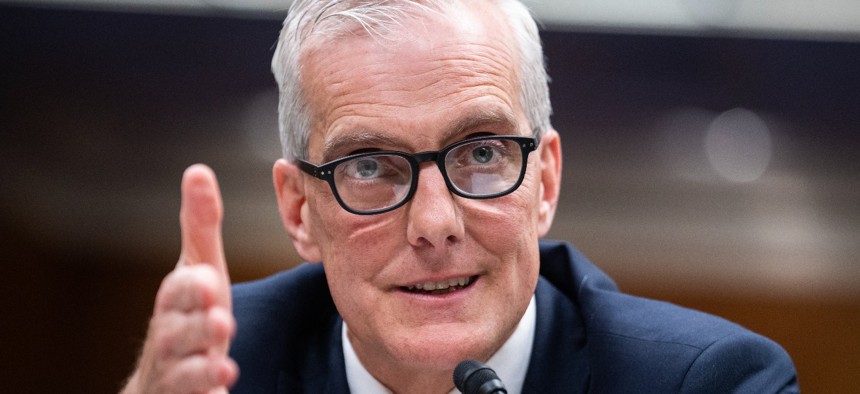
VA Secretary Denis McDonough touted the deal with the union on Tuesday. Tom Williams/CQ-Roll Call, Inc via Getty Images
VA, AFGE celebrate ‘best union contract’ in federal government
After six years of often acrimonious negotiations, the Veterans Affairs Department and the nation’s largest federal employee union on Tuesday signed a new collective bargaining agreement.
The Veterans Affairs Department and the nation’s largest federal employee union on Tuesday sought to turn over a new leaf after years of disputes and litigation, formally signing a new collective bargaining agreement.
The agreement, tentatively reached in April, allows VA to implement a plan to streamline hiring of Title 5 employees across the department, but otherwise preserves in full the provisions of their previous contract, reached in 2011. The parties held a signing ceremony Tuesday at the Salem VA Medical Center in southwestern Virginia, in honor of Alma Lee, president of AFGE’s National Veterans Affairs Council and a three-decade federal employee and union leader.
“This is the very best union contract in the entire federal government, thanks to many of you here in this room,” AFGE National President Everett Kelley said. “The 304,000 VA workers [we] represent have all of you to thank . . . We have a good contract, but now it’s up to us to make it work. We have to be a shining light for the rest of the agencies throughout the government.”
Tuesday’s event marks the end of a six-year odyssey rife with acrimony and litigation to update the parties’ collective bargaining agreement. During the Trump administration, management officials pushed negotiations to an impasse, leading the Federal Service Impasses Panel to impose a largely anti-labor contract. But that deal fell through after the union’s membership failed to ratify it.

And despite a 2021 settlement agreement to dispense with a variety of grievances and other litigation against the department and President Biden and VA Secretary Denis McDonough being more vocally supportive of pursuing collaborative labor-management relations than their predecessors, the parties remained deadlocked until early this year, when an independent arbitrator ruled that management continued to engage in bad faith bargaining. Union officials told Government Executive last spring that the decision, and subsequent media coverage, prompted a fresh and more productive start to talks.
McDonough on Tuesday touted the deal, as well as recent laws like the PACT Act to expand benefits for veterans exposed to burn pits and the VA Nurse and Physician Assistant Retention and Income Security Enhancement Act, both signed last year, as proof of the Biden administration’s commitment to improving the lives of VA workers.
“We want to be a model employer, and that means taking good care of all of the people who take care of our veterans,” McDonough said. “[We] raised retention incentives and [provided] more pay incentives, special contribution rewards, increased the income cap for child care to support working parents. We published a blueprint for more flexible work hours for providers, and we’re working to increase employees’ advancement opportunities.”
The new union contract also enables the VA to continue its much-publicized hiring spree, which began in part due to the anticipated influx of new patients thanks to the PACT Act.
“At [the Veterans Health Administration], fiscal 2022 broke all hiring records: 48,500 new clinical and administrative staff, 5,000 more than were hired in 2021,” McDonough said. “And now in [fiscal 2023], we’re at the fastest workforce growth in 15 years . . . We’ve done all this together—AFGE and VA working together, listening to each other.”
At a press conference following the ceremony, McDonough said the new contract, and a repaired labor-management relationship, will translate into better care for veterans. And he seemed to dismiss efforts by congressional Republicans to revive the provisions of the controversial 2017 VA Accountability and Whistleblower Protection Act as something that would distract the department from its mission. The Biden administration last month agreed to a $100 million settlement to allow those improperly dismissed using that law to return to work.
“We believe we have the authorities to move with dispatch when our providers are not focused first and foremost on veteran centered care,” he said. “Where we have encountered problems over the last six years is when we use the new authorities that administrative and federal bodies have found [to be unlawful]. We want to use the authorities we have in a way that allows us to manage our departments, rather than sit in front of administrative bodies and federal courts, which is a diversion of our time and resources.”







